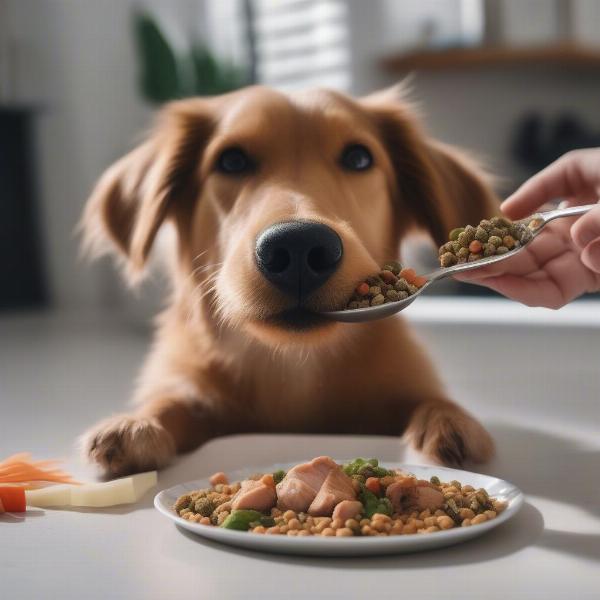Chicken is a popular ingredient in many dog foods, and it’s understandable why some owners might wonder if their furry friends could thrive on a diet solely consisting of chicken quarters. While dogs do enjoy chicken, a diet of only chicken quarters is not a balanced or healthy option. It lacks essential nutrients that dogs need to stay healthy and can lead to various health problems in the long run. This article will delve into the nutritional needs of dogs and explain why relying solely on chicken quarters is inadequate.
Why a Chicken-Only Diet is Insufficient for Dogs
While chicken is a good source of protein, a diet consisting solely of chicken quarters, even cooked ones, is deficient in several vital nutrients. Dogs require a balanced diet that includes proteins, fats, carbohydrates, vitamins, and minerals. Relying only on chicken quarters can lead to nutritional deficiencies, causing health issues such as weakened bones, skin problems, and a compromised immune system. Furthermore, chicken quarters are high in phosphorus and low in calcium, an imbalance that can negatively impact bone development, especially in puppies.
Essential Nutrients for a Healthy Dog
Dogs need a variety of nutrients to thrive. These include:
- Protein: For building and repairing tissues, supporting immune function, and providing energy.
- Fats: For healthy skin and coat, energy, and absorbing fat-soluble vitamins.
- Carbohydrates: For energy and fiber.
- Vitamins: Essential for various bodily functions, including immune health, vision, and bone growth.
- Minerals: For strong bones, healthy blood, and proper nerve function.
A diet of only chicken quarters cannot provide all of these nutrients in the correct proportions.
The Risks of a Chicken-Only Diet
Feeding your dog only chicken quarters can lead to several health problems:
- Nutritional Deficiencies: Lack of essential vitamins and minerals can lead to various health issues, including anemia, weakened bones, and a compromised immune system.
- Skeletal Problems: The imbalance of phosphorus and calcium in chicken quarters can lead to skeletal deformities, especially in growing puppies.
- Pancreatitis: The high fat content in chicken skin can contribute to pancreatitis, a painful inflammation of the pancreas.
- Digestive Issues: A lack of fiber can lead to constipation and other digestive problems.
 Dog Enjoying a Balanced Meal
Dog Enjoying a Balanced Meal
What Should You Feed Your Dog?
Instead of chicken quarters alone, feed your dog a complete and balanced diet. High-quality commercial dog food is formulated to meet all of a dog’s nutritional requirements. Look for food that meets the Association of American Feed Control Officials (AAFCO) standards. If you are considering a homemade diet, consult with a veterinary nutritionist to ensure it is balanced and provides all the necessary nutrients.
Can Chicken Be Part of a Healthy Dog Diet?
Yes, absolutely! Cooked, boneless, skinless chicken can be a healthy and delicious addition to a balanced dog diet. It can be mixed with dog food or used as a treat in moderation. Just remember that it should not be the sole source of nutrition.
Conclusion
While dogs love chicken, feeding them only chicken quarters is not a sustainable or healthy practice. It can lead to various health issues due to nutritional deficiencies. A balanced diet, whether commercial dog food or a carefully planned homemade diet, is crucial for your dog’s overall health and well-being. Consult with your veterinarian to determine the best diet for your dog’s specific needs.
FAQ
- Can I give my dog raw chicken quarters? No, raw chicken can contain harmful bacteria like Salmonella and Campylobacter, which can cause illness in both dogs and humans.
- What are some healthy treats I can give my dog besides chicken? Consider dog-safe fruits and vegetables like carrots, apples (without the core and seeds), and blueberries, or commercially available dog treats.
- How can I tell if my dog has a nutritional deficiency? Signs of nutritional deficiency can vary but may include dull coat, skin problems, lethargy, and weight loss. Consult your veterinarian if you notice any of these symptoms.
- How often should I feed my dog? Most adult dogs thrive on being fed twice a day. Puppies may require more frequent meals.
- What if my dog is a picky eater? Consult your veterinarian. They can help rule out any underlying medical conditions and offer advice on how to encourage healthy eating habits.
- Is it okay to give my dog supplements? Only give your dog supplements under the guidance of your veterinarian.
- How can I transition my dog to a new food? Gradually introduce the new food over several days, mixing it with the old food in increasing proportions.
Related Articles:
(If available, add links to related articles on ilmdog.com here. If not available, omit this section.)
About ILM Dog
ILM Dog is your trusted global resource for all things dog-related. We offer expert advice and practical information on dog breeds, health and medical care, training, nutrition, grooming, and much more. Whether you’re a first-time dog owner or a seasoned expert, ILM Dog is here to support you every step of the way. Contact us today for more information: Email: [email protected], Phone: +44 20-3965-8624.